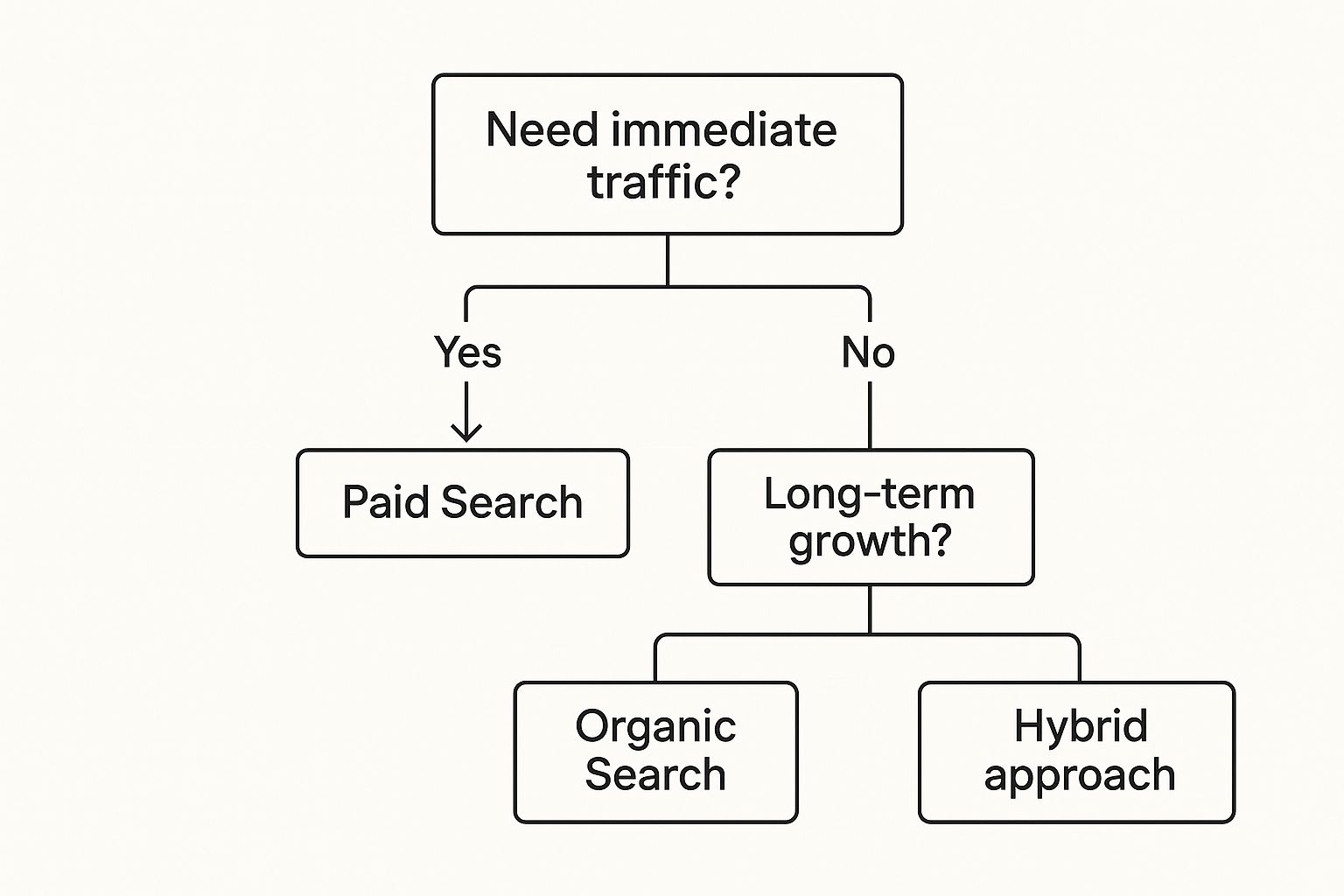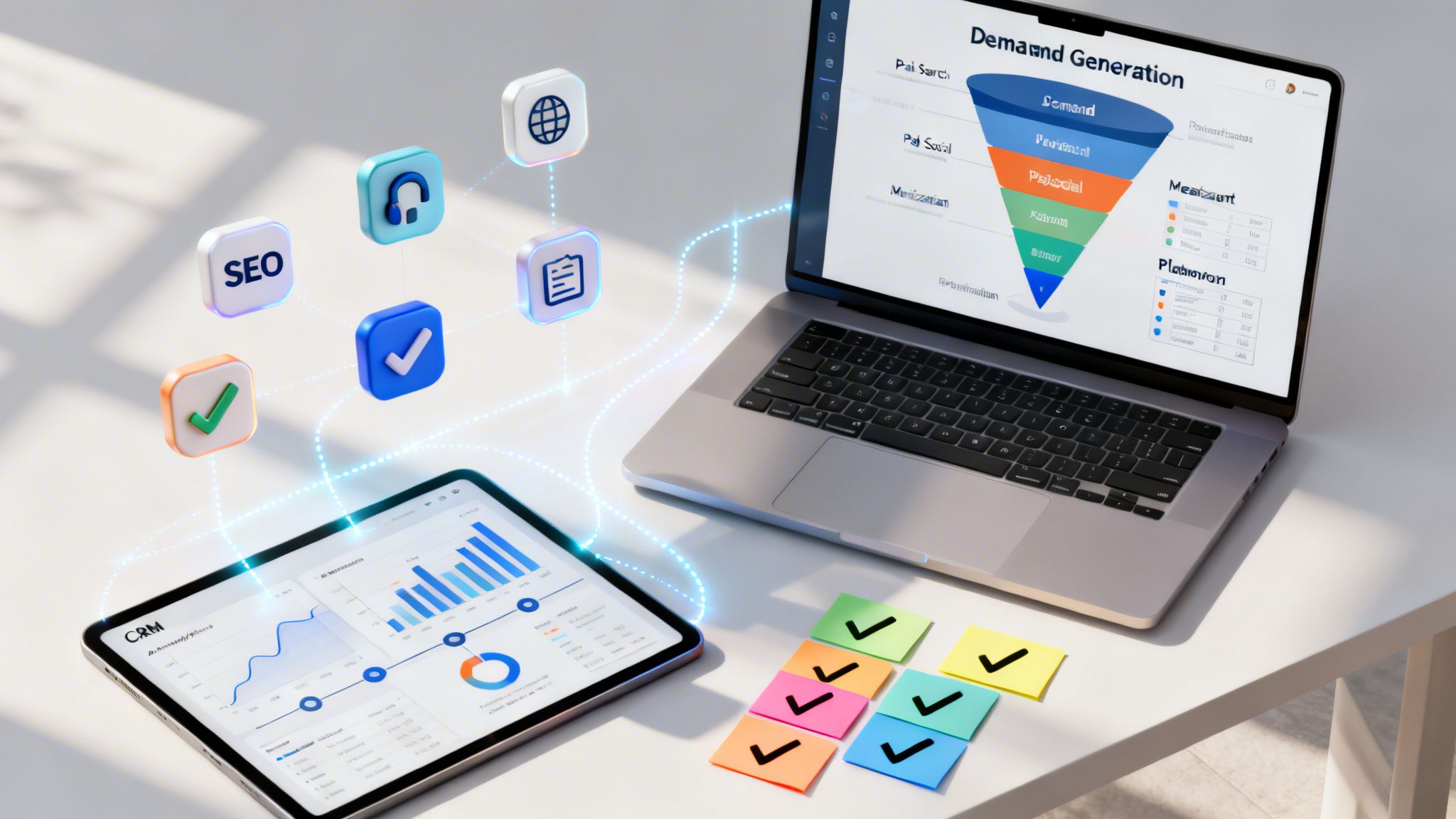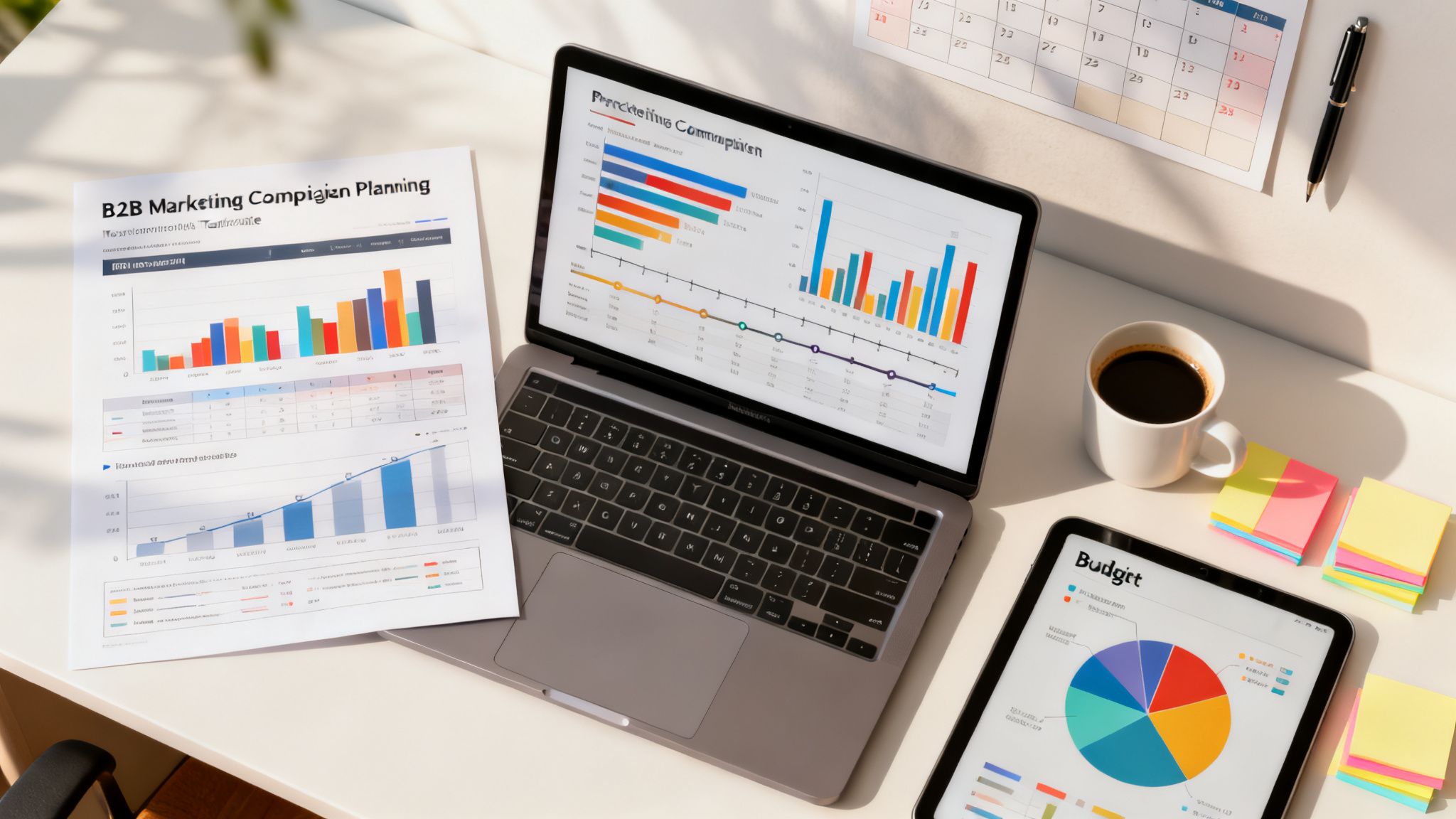The paid search vs. organic search debate boils down to a simple question: are you buying your visibility or earning it? Think of paid search as renting a prime billboard on the busiest digital highway—it delivers immediate, scalable traffic. Organic search, in contrast, is like building and owning a storefront in a prime location. It's a long-term asset built on trust and authority that pays dividends for years to come.
Understanding the Two Pillars of Search Marketing
The real question isn’t which channel is “better,” but which aligns with your business goals right now. Both are powerful methods for attracting visitors from search engines like Google, but they operate on entirely different timelines and budget models.
Paid search, commonly known as Pay-Per-Click (PPC), allows you to jump to the front of the line. Your website appears in designated ad slots at the very top of the search engine results page (SERP). You pay a fee each time someone clicks your ad, giving you a direct, controllable lever for traffic. This makes it ideal for immediate results, such as product launches or seasonal promotions.
Organic search is the long game. It relies on Search Engine Optimization (SEO) to climb the rankings naturally. This involves optimizing your site’s technical health, creating genuinely helpful content, and building authority so search engines see you as a top-tier result. While it requires more upfront time and effort, the payoff is a durable presence that builds significant brand credibility.
Here's the critical difference: Paid search buys you instant exposure, but that visibility vanishes the moment you stop paying. Organic search builds a lasting digital asset that can continue generating traffic long after your initial investment.
To make this crystal clear, let's break down their core differences in a quick-glance table.
Paid Search vs. Organic Search: At a Glance
The table below offers a straightforward summary of how paid and organic search stack up against each other on the most important attributes.
Ultimately, this comparison highlights the fundamental trade-off: paid search offers speed and control, while organic search delivers sustainable, long-term value.
How User Behavior and Trust Differ
The gap between a paid ad and an organic listing isn't just about placement; it's deeply rooted in user psychology. Today's searchers are incredibly adept at identifying ads, and that recognition fundamentally changes how they engage with the results.
Many users have developed "ad blindness," instinctively scrolling past the sponsored listings at the top. This happens because they perceive organic results as more authentic—as if they've received an editorial endorsement from the search engine itself. An organic ranking feels earned, not bought.
This perception is a powerful trust signal with a direct impact on performance. It’s precisely why securing a top organic spot is such a prized long-term asset for any brand.
The Power of Earned Credibility
Organic listings are widely considered the "real" results, awarded based on relevance, authority, and quality. This isn't just a gut feeling; the data backs it up.
The number one spot in Google's organic search commands an average click-through rate (CTR) of 27.6%. Compare that to the average CTR for paid search ads, which hovers around 1.63% globally, and the trust gap becomes evident.
This trust is tied directly to Google's relentless focus on content quality. To rank well organically, your content must demonstrate expertise and authority. You can learn more about how Google measures this in our guide to E-A-T and why it matters for SEO.
The core takeaway is that users click on organic results because they believe the search engine has identified it as the best answer. In contrast, they know a paid ad is there because someone paid for that placement.
The High-Intent Nature of Paid Clicks
While organic search clearly wins the trust game, paid search excels in a different arena: high-intent action. Users clicking on paid ads are often much further down the sales funnel. They are ready to buy, request a quote, or sign up for a service right now.
This transactional mindset is what makes the paid search vs. organic search debate so nuanced. Even though fewer people might click an ad, those who do are often highly qualified and primed to convert.
Here’s how typical user intent breaks down for each channel:
- Organic Search Intent: Users are often in the research or information-gathering phase. They're comparing solutions, looking for educational articles, or trying to understand a problem.
- Paid Search Intent: These users are often ready to act. Their searches are more specific and commercial, like "emergency plumber near me" or "buy running shoes online."
Understanding this distinction is crucial. A click from a paid ad often carries more immediate commercial value, but a click from an organic result builds brand trust and lasting customer relationships.
A Realistic Breakdown of Costs and ROI

It’s easy to frame the paid search vs. organic search debate as a "paid vs. free" argument, but that's a misconception. Organic search is far from free; it requires a significant, ongoing investment of time and resources. The real difference isn’t if you pay, but how you pay and the nature of your return.
Paid search involves direct, predictable expenses. Every click has a clear price tag, influenced by factors like keyword competition and ad quality. Organic search, on the other hand, is an investment in building assets—content, technical health, and brand authority—that deliver value for years.
The Direct Costs of Paid Search
With paid search, your budget is spent directly on buying traffic. You’re paying for prime real estate at the top of the search results, a powerful way to spark immediate, targeted action. To dive deeper, explore the fundamentals of paid search advertising in our detailed guide.
The main expenses in a PPC campaign include:
- Ad Spend: The core cost, paid directly to platforms like Google for each click (Cost-Per-Click or CPC). In hyper-competitive fields like law or finance, a single click can cost hundreds of dollars.
- Campaign Management: Effective campaign management requires expertise, whether from an agency or an in-house specialist. It involves continuous keyword research, ad copywriting, bid adjustments, and performance analysis.
- Creative Assets: Compelling ads often require professional design for display banners or video production, adding another layer to your costs.
The upside is total budget control. You can set a daily or monthly cap, and the campaign pauses when you reach it. The catch? The moment you stop paying, the traffic stops.
The Resource Investment for Organic Search
Organic search operates under a different economic model. Instead of paying per click, you’re investing in building a self-sustaining traffic engine. Think of it as an upfront investment that generates long-term value.
The ROI from paid search is immediate but finite—it's tied directly to your ad budget. The ROI from organic search is slower to materialize but compounds over time, creating a valuable asset that continues to generate traffic long after the initial investment.
Here’s where resources are allocated in a robust SEO strategy:
- Expert Talent: High-level SEO demands deep technical knowledge, sharp content strategy skills, and proven link-building experience. This usually means hiring a specialized agency or building a dedicated internal team.
- Content Development: Creating top-tier, authoritative content is non-negotiable. This involves writers, editors, designers, and subject matter experts to produce articles, guides, and videos that earn their rankings.
- Technical Optimization: Keeping your website fast, secure, and easily crawlable by search engines is an ongoing task that requires developer resources.
- Outreach and Link Building: Earning high-quality backlinks from reputable websites is a labor-intensive but essential process for building your site's authority in Google's eyes.
Ultimately, paid search offers a measurable, immediate return, while organic search builds an appreciating asset with compounding value. The right path depends on your timeline, budget, and strategic objectives.
Analyzing the Impact on Conversions
Traffic alone doesn't pay the bills—conversions do. When analyzing the business impact of paid search vs. organic search, it becomes clear they drive conversions in fundamentally different ways. The choice often boils down to a trade-off: do you need immediate, high-intent action, or are you building for sustained, trust-based growth?
Paid search is the sprinter of the conversion world. It’s designed to capture users at the very end of their decision-making process. Think of searches like "emergency roof repair near me" or "buy size 10 running shoes." These individuals have an urgent problem and are ready to act now, making them perfect targets for laser-focused ad campaigns.
This makes paid search indispensable for time-sensitive initiatives. Launching a new product, running a flash sale, or quickly testing a new market? PPC is your go-to for driving immediate revenue and gathering rapid feedback.
The Trust Factor in Organic Conversions
Organic search plays the long game. Its conversion power is built on a solid foundation of trust and authority. Someone who finds you organically has likely engaged with your content, recognized your brand as a credible source, and begun to trust your expertise. It's less of a transaction and more of a relationship.
This difference in user trust is reflected in the numbers. While paid search is fantastic for immediate action, organic search cultivates a more loyal audience that often converts on higher-value offers over time.
Recent studies support this, showing that organic search can achieve a conversion rate of 14.6%, while paid search lands closer to 10%. That gap highlights the compounding value of investing in SEO—people inherently trust a natural search result more than a sponsored ad. You can find more SEO vs PPC statistics on adcore.com that explore this.
Measuring Success with Attribution Models
To truly understand what’s working, you must measure it accurately. Different attribution models assign conversion credit in various ways, and selecting the right one is key to optimizing your marketing mix for profitability.
Here are a few common models:
- First-Click Attribution: Gives all the credit to the first touchpoint. This model tends to favor top-of-funnel channels like organic search, which often introduces a user to your brand.
- Last-Click Attribution: Assigns all credit to the final click before a conversion. This model often makes paid search look like the hero, as ads frequently capture users at the moment of purchase.
- Linear Attribution: Spreads credit evenly across every touchpoint in the customer journey, providing a more balanced view of how paid and organic search work together.
Implementing robust conversion tracking is non-negotiable for reliable data. For a deep dive, check out our guide on implementing Google Ads conversion tracking to ensure you’re measuring what truly matters. By mastering attribution, you can move beyond simply counting conversions to strategically investing in the channels that deliver real revenue.
Adapting Your Strategy for an AI-Powered SERP

The classic debate of paid search vs. organic search is being reshaped by artificial intelligence. New features like Google's AI Overviews are redesigning the Search Engine Results Page (SERP), often providing direct answers to user queries—no click required.
This new reality challenges both paid and organic playbooks. When an AI summary provides a neat answer at the top of the page, the incentive to scroll down and click on other links, whether paid or organic, diminishes significantly. We are entering a "zero-click" environment where mere visibility is not enough. Your strategy must evolve.
Navigating the Click Reduction
The impact of AI-driven search is not just theoretical; the data is already here. The rollout of AI Overviews has led to a noticeable dip in click-through rates. Organic search has seen CTRs fall by approximately 67.8% on SERPs with AI Overviews, while paid search has experienced a 58.0% decline. You can explore more of these trends at RankFuse.com.
This data makes it clear: both paid and organic strategies must aim for more than just driving clicks back to a website.
The new goal is to influence the user's journey directly within the SERP itself. This means optimizing your content not just to rank, but to be the source material for the AI's answer.
Future-Proofing Your Search Strategy
To remain competitive, you need an integrated approach that actively leverages AI. Stop thinking of paid and organic as separate channels; they must work in tandem to capture attention on a more crowded and complex SERP.
Here are a few ways to adapt your strategy for visibility and impact:
- Optimize for "Featured" Status: Structure your content for easy AI digestion. Use clear headings, bullet points, and short, direct answers to common questions. Your goal is to become a citable source within the AI Overview.
- Target Complex, Long-Tail Queries: AI excels at answering simple questions. Your opportunity lies in creating deep, authoritative content that tackles complex problems AI summaries cannot fully resolve, compelling users to click through for the complete picture. Learn more in our analysis on how generative AI will affect SEO.
- Integrate PPC and SEO Data: Use paid search campaigns as a testing ground. Identify which messages, headlines, and value propositions generate the most engagement. Apply these winning insights to your organic content to better match user intent and improve your chances of being featured by AI.
Choosing the Right Channel for Your Goals
So, paid search or organic search? The truth is, it's not about picking a "winner." It's about matching the right tool to the right job. Your business goals, timeline, and budget dictate which channel—or, more often, which combination of the two—will deliver the desired results. Forget the one-size-fits-all approach; strategic thinking is key.
Think of it this way: paid search is your accelerator, perfect when speed is critical and you need to drive immediate, measurable results. On the other hand, organic search is your foundation, built for long-term authority and a sustainable traffic engine that pays dividends for years.
This simple guide can help you determine where to start, depending on whether you need traffic now or are building for the long haul.

As you can see, the path you take boils down to your urgency and strategic focus, which will steer you toward the most effective starting point for your unique situation.
When Paid Search Is the Right Move
Paid search shines in scenarios demanding speed, granular control, and surgical precision. If your goals align with the following, a PPC-first strategy is likely your best bet:
- New Product Launches: Instantly get a new product in front of a highly targeted audience without waiting for organic rankings to catch up.
- Time-Sensitive Promotions: Drive immediate traffic for a holiday sale, webinar, or limited-time offer where momentum is everything.
- Rapid Market Testing: Quickly validate demand for a new service by testing different marketing messages and analyzing real-time click and conversion data.
- Targeting High-Intent Keywords: Capture users at the exact moment they’re ready to buy by targeting hyper-specific, commercial-intent keywords.
When Organic Search Should Be Your Priority
Organic search is the undisputed champion for building a lasting digital asset and establishing deep credibility in your market. Focus your resources on SEO when your objectives are centered on the bigger picture:
- Building Brand Authority: Earning top rankings for key industry terms positions your brand as a trusted leader and the go-to resource in your space.
- Creating a Sustainable Lead Engine: Develop a content ecosystem that consistently attracts and nurtures qualified leads over the long haul, reducing reliance on ad spend.
- Maximizing Long-Term ROI: While the upfront investment is significant, the compounding value of a strong organic presence delivers a superior return over time.
The most powerful strategy often isn't choosing between paid or organic, but creating a synergy between them. Use the immediate data from your paid campaigns—like which keywords convert best and what ad copy resonates—to inform and prioritize your long-term organic content strategy. That's how you get truly superior, holistic results.
To make this even clearer, the table below breaks down which channel to prioritize based on common business scenarios.
Strategic Channel Selection Guide
Ultimately, this guide helps frame the initial decision. Most mature strategies find a way to make these two powerful channels work together, creating a feedback loop where each one makes the other stronger.
Have Questions? We Have Answers.
It’s natural to have questions when weighing paid search vs. organic search. Let's clear up a few common ones to help you map out your strategy.
Can I Really Get By With Just SEO and No Paid Ads?
Absolutely. Many businesses have built successful brands on the back of a solid organic search strategy, patiently creating top-notch content and earning authority over time. SEO is a powerful, standalone approach for building a long-term, sustainable asset.
However, incorporating paid search can accelerate your growth. It delivers instant traffic and, more importantly, provides a treasure trove of keyword and conversion data. You can then feed these insights back into your SEO plan, making your long-term efforts smarter and more effective.
How Long Does It Actually Take to See SEO Results?
Think of SEO as a marathon, not a sprint. While you might see some initial movement in a few weeks, achieving first-page rankings for competitive keywords typically takes 6 to 12 months of consistent, high-quality work.
The timeline depends on your website's current authority, the competitiveness of your niche, and the discipline of your strategy. Patience isn't just a virtue here; it's a requirement.
Is Paid Search a Smart Move for a Small Business?
Yes, it can be a game-changer. Platforms like Google Ads are great equalizers, offering laser-focused targeting and complete budget control.
A small business can succeed with paid search by:
- Setting a firm daily budget to manage costs effectively.
- Targeting specific geographic areas to connect with local customers.
- Focusing on niche, long-tail keywords that signal high purchase intent.
The key is to have clear goals, track every conversion meticulously, and continuously optimize campaigns to maximize the return on every dollar spent.
Ready to stop guessing and start growing? Twelverays crafts data-driven paid and organic search strategies that deliver measurable results and real revenue. See how our expert team can build a tailored plan for your business at https://twelverays.agency.





